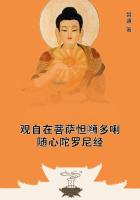She escaped, ashamed and happy at having gone there. Innocence alone can dare to be so bold. Once enlightened, virtue makes her calculations as well as vice. Eugenie, who had not trembled beside her cousin, could scarcely stand upon her legs when she regained her chamber. Her ignorant life had suddenly come to an end; she reasoned, she rebuked herself with many reproaches.
"What will he think of me? He will think that I love him!"That was what she most wished him to think. An honest love has its own prescience, and knows that love begets love. What an event for this poor solitary girl thus to have entered the chamber of a young man!
Are there not thoughts and actions in the life of love which to certain souls bear the full meaning of the holiest espousals? An hour later she went to her mother and dressed her as usual. Then they both came down and sat in their places before the window waiting for Grandet, with that cruel anxiety which, according to the individual character, freezes the heart or warms it, shrivels or dilates it, when a scene is feared, a punishment expected,--a feeling so natural that even domestic animals possess it, and whine at the slightest pain of punishment, though they make no outcry when they inadvertently hurt themselves. The goodman came down; but he spoke to his wife with an absent manner, kissed Eugenie, and sat down to table without appearing to remember his threats of the night before.
"What has become of my nephew? The lad gives no trouble.""Monsieur, he is asleep," answered Nanon.
"So much the better; he won't want a wax candle," said Grandet in a jeering tone.
This unusual clemency, this bitter gaiety, struck Madame Grandet with amazement, and she looked at her husband attentively. The goodman--here it may be well to explain that in Touraine, Anjou, Pitou, and Bretagne the word "goodman," already used to designate Grandet, is bestowed as often upon harsh and cruel men as upon those of kindly temperament, when either have reached a certain age; the title means nothing on the score of individual gentleness--the goodman took his hat and gloves, saying as he went out,--"I am going to loiter about the market-place and find Cruchot.""Eugenie, your father certainly has something on his mind."Grandet, who was a poor sleeper, employed half his nights in the preliminary calculations which gave such astonishing accuracy to his views and observations and schemes, and secured to them the unfailing success at sight of which his townsmen stood amazed. All human power is a compound of time and patience. Powerful beings will and wait. The life of a miser is the constant exercise of human power put to the service of self. It rests on two sentiments only,--self-love and self-interest; but self-interest being to a certain extent compact and intelligent self-love, the visible sign of real superiority, it follows that self-love and self-interest are two parts of the same whole,--egotism. From this arises, perhaps, the excessive curiosity shown in the habits of a miser's life whenever they are put before the world. Every nature holds by a thread to those beings who challenge all human sentiments by concentrating all in one passion. Where is the man without desire? and what social desire can be satisfied without money?
Grandet unquestionably "had something on his mind," to use his wife's expression. There was in him, as in all misers, a persistent craving to play a commercial game with other men and win their money legally.
To impose upon other people was to him a sign of power, a perpetual proof that he had won the right to despise those feeble beings who suffer themselves to be preyed upon in this world. Oh! who has ever truly understood the lamb lying peacefully at the feet of God?--touching emblem of all terrestrial victims, myth of their future, suffering and weakness glorified! This lamb it is which the miser fattens, puts in his fold, slaughters, cooks, eats, and then despises.
The pasture of misers is compounded of money and disdain. During the night Grandet's ideas had taken another course, which was the reason of his sudden clemency. He had hatched a plot by which to trick the Parisians, to decoy and dupe and snare them, to drive them into a trap, and make them go and come and sweat and hope and turn pale,--a plot by which to amuse himself, the old provincial cooper, sitting there beneath his gloomy rafters, or passing up and down the rotten staircase of his house in Saumur. His nephew filled his mind. He wished to save the honor of his dead brother without the cost of a penny to the son or to himself. His own funds he was about to invest for three years; he had therefore nothing further to do than to manage his property in Saumur. He needed some nutriment for his malicious activity, and he found it suddenly in his brother's failure. Feeling nothing to squeeze between his own paws, he resolved to crush the Parisians in behalf of Charles, and to play the part of a good brother on the cheapest terms. The honor of the family counted for so little in this scheme that his good intentions might be likened to the interest a gambler takes in seeing a game well played in which he has no stake. The Cruchots were a necessary part of his plan; but he would not seek them,--he resolved to make them come to him, and to lead up that very evening to a comedy whose plot he had just conceived, which should make him on the morrow an object of admiration to the whole town without its costing him a single penny.














